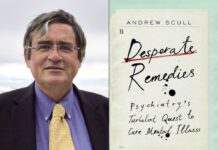“Holy Shit!” Psychiatry’s Cognitive Dissonance on Display
Even those who would seek to reform the profession of psychiatry cannot confront the reality that exists in the research literature
SSRIs, Lindsay Clancy, and Me
Sharing the similarities between Lindsay Clancy's homicidal episode and my own will hopefully help prevent rare SSRI-induced suicides and homicides, including mass shootings.
Inside a Forensic Psychiatry Unit: Here’s How to Survive
Sean Gunderson, who was detained by the criminal justice system for 17 years after receiving an NGRI verdict, documents the life of a forensic psychiatry inmate.
Maryland Enacts a “Draconian” Assisted Outpatient Treatment Program
Advocates vow to keep resisting psychiatric force, fighting for rights-based supports
Is Mad in America Doing More Harm Than Good?
A dialogue between Dr. Jim Phelps—a psychiatrist who questions whether MIA is doing more harm than good by reporting the results of long-term trials of psychiatric drugs—and Robert Whitaker, founder of MIA.
Dismissing the “Human Experience”: College Students Feel Unseen by the Medical Model of Mental...
In conversations with college students and recent graduates from across the country and around the world, they described feeling dismissed by views of mental health that narrow their experiences to individual medical problems.
The Parts Within Us: An Interview with Richard Schwartz, Creator of Internal Family Systems
IFS is a different paradigm, which says that rather than being a sign of pathology, it’s the nature of the mind to have “parts." We’re born that way because they're all valuable.
Dramatic Rise in Police Interventions on 988 Callers
New data reveals that four times as many callers to 988 as previously publicly claimed are getting visited by police or emergency medical services.
“You Can’t Coerce Someone into Wanting to Be Alive”: The Carceral Heart of the...
“You can’t coerce someone into wanting to be alive. Force just doesn’t work. People must be invited to live while supporters (healthcare professionals, social workers, loved ones) make their lives and world more habitable.”
Robert Whitaker Answers Reader Questions on Mad in America, the Biopsychosocial Model, and Psychiatric...
On the Mad in America podcast this week we have Robert Whitaker with us to answer questions sent in by readers and listeners.
Chris van Tulleken—Ultra-Processed People: Why Do We All Eat Stuff That Isn’t Food and...
We are joined by Dr. Chris van Tulleken who talks about the science, economics, history, and production of ultra-processed food. We discuss some of the effects of UPF on our brains and bodies and how the food industry positions UPF to dominate our diets.
Threatened for Telling the Truth: Polish Journalist Speaks Out
Now I’m under attack, with threats of violence flung at me alongside threats of lawsuits. And all because I shared the large body of peer-reviewed research that contradicts the mainstream assumptions of psychiatry.
Toward a Critical Self-Reflective Psychiatry: An Interview with Pat Bracken
MIA’s Justin Karter interviews critical psychiatrist and philosopher Pat Bracken about the necessity of challenging received wisdom.
How Grief Became a Disorder and What This Means About Us: An Interview with...
MIA’s Zenobia Morrill interviews psychologist Kaori Wada about what the creation of Prolonged Grief Disorder reveals about our culture and the current status of psychology.
Bringing Human Rights to Mental Health Care: An Interview with UN Envoy Dainius Pūras
MIA's Ana Florence interviews United Nations Special Rapporteur Dainius Pūras about his own journey as a psychiatrist and the future of rights-based approaches to mental health.
Andrew Rich: “I Didn’t Know Stuff Like This Existed”
In this second part of MIA’s report on compulsory outpatient treatment orders, Michael Simonson tells of how he came to report on this topic, the results from MIA’s survey of people who have experienced such forced treatment, his interviews with several of the survey respondents, and more on Andrew Rich’s life.
Should Everyone Be in Therapy?
A new study finds that those with mild distress are three times as likely to feel worse after therapy than to receive some benefit.
Moving Mental Health Work Away from Diagnosis: Sarah Kamens and Peter Kinderman on New...
MIA's Justin Karter interviews two leaders of the Task Force on Diagnostic Alternatives, a group of mental health professionals who have issued an open letter demanding a new look at psychiatric diagnosis.
Brain Implants: Spinning the Trial Results to Protect the Product
The published report of the Broaden Trial of Deep Brain Stimulation for Depression whitewashed the results: although the efficacy results were negative, the investigators concluded that the therapy still showed "promise", and adverse events suffered by the patients were downplayed or attributed to the disease, and not the treatment. An in-depth investigation of how the trial results were spun, and interviews with patients that tell of harm done.
Johann Hari: Stolen Focus – Why You Can’t Pay Attention
Johann Hari joins us to talk about his latest book Stolen Focus: Why You Can’t Pay Attention, in which he examines the reasons behind our inability to focus and seeks to understand how this crisis affects our wellbeing and society.
Andrew Scull—Desperate Remedies: Psychiatry’s Turbulent Quest to Cure Mental Illness
Sociologist and author Andrew Scull discusses the history of psychiatry's "Desperate Remedies," from lobotomy and the asylum to the failures of today's drugs and the fads of ketamine and deep brain stimulation.
Jill Nickens – The Akathisia Alliance for Education and Research
This week on the Mad in America podcast we turn our attention to prescription-drug-induced akathisia and joining me to discuss this is Jill Nickens. Jill is the president and founder of the Akathisia Alliance for Education and Research, a nonprofit organization formed by people who have personal experience of akathisia.
Fighting for the Meaning of Madness: An Interview with Dr. John Read
Akansha Vaswani interviews Dr. John Read about the influences on his work and his research on madness, psychosis, and the mental health industry.
David Healy – Polluting Our Internal Environments: The Perils of Polypharmacy
On the MIA Podcast, Dr David Healy discusses World Tapering Day, antidepressant treatment and sensory neuropathy and the difficulties that can be encountered when trying to deprescribe.
Feminism, Psychoanalysis and Critical Psychology: An Interview with Bethany Morris
MIA's Micah Ingle interviews Bethany Morris about the psychoanalytic study of film and the history of the "monstrous feminine" in psychiatry.

































